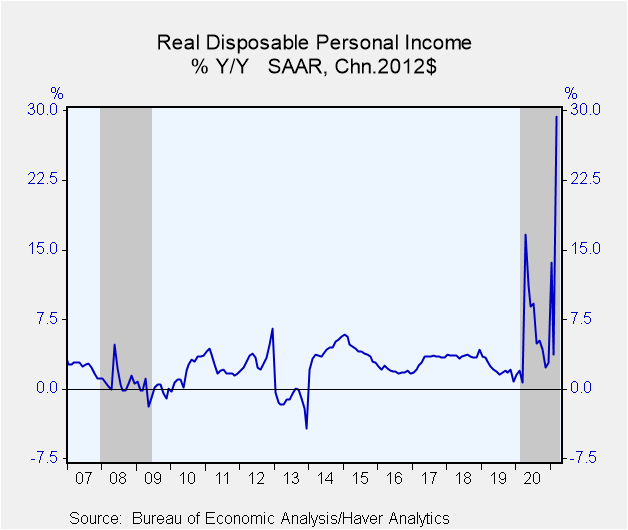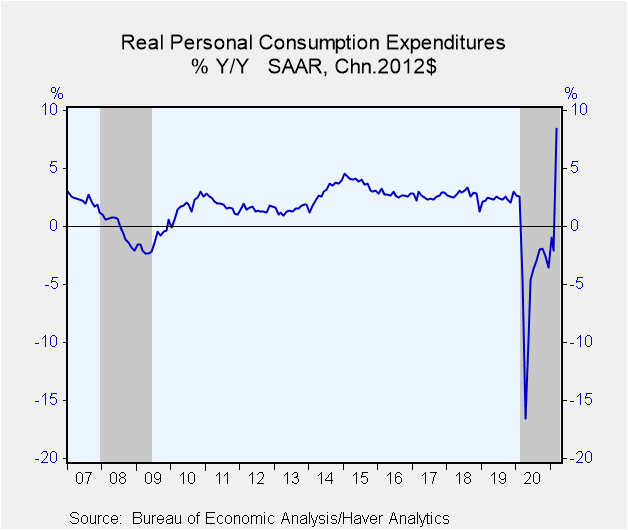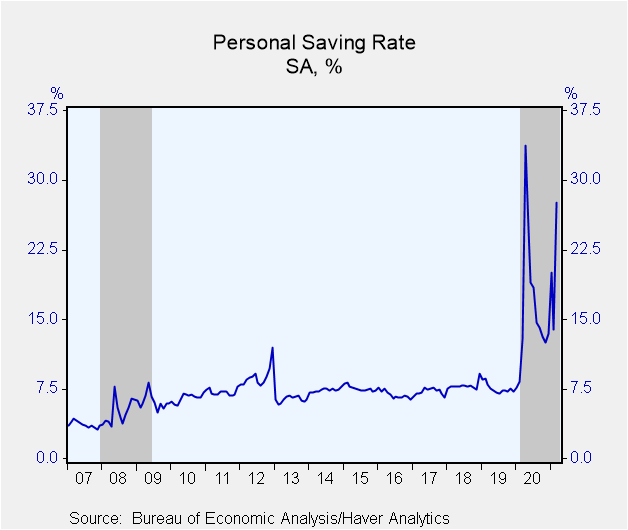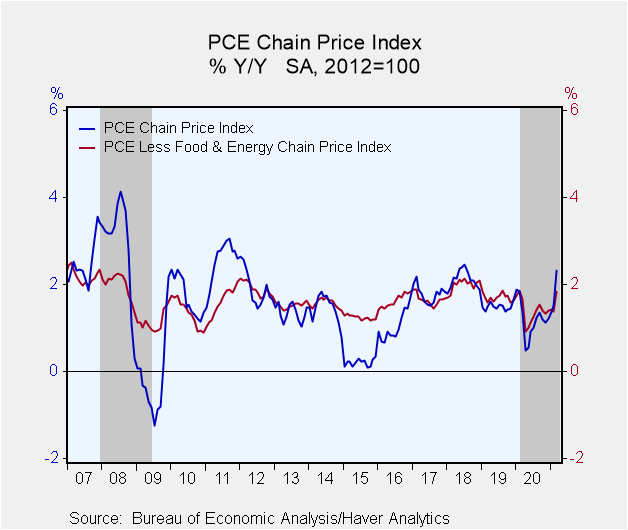 Global| Apr 30 2021
Global| Apr 30 2021U.S. Personal Income Surges With Stimulus Checks during March; Spending Strengthens
by:Tom Moeller
|in:Economy in Brief
Summary
• Total income jumps and wages strengthen. • Spending increases broadly. • Pricing power picks up. Personal income jumped a record 21.1% during March (29.0% y/y) after a 7.0% February fall, revised from -7.1%. A 19.7% rise had been [...]
• Total income jumps and wages strengthen.
• Spending increases broadly.
• Pricing power picks up.
Personal income jumped a record 21.1% during March (29.0% y/y) after a 7.0% February fall, revised from -7.1%. A 19.7% rise had been expected in the Action Economics Forecast Survey. Transfer payments jumped with the federal government's $1,400 stimulus payments to most individuals. Wages & salaries surged 1.1% (4.4% y/y) with strength in payroll employment. Proprietors' income jumped 6.2% (11.6% y/y) after strengthening 3.0% in February. Rental income rose 1.0% (2.5% y/y) following two straight 0.9% gains. Earnings on assets rose 0.3% (-2.3% y/y) as dividend income held steady (-4.2% y/y) and interest income improved 0.6% (-0.9% y/y). Disposable personal income surged 23.6% (32.3% y/y) last month after falling 7.9% in February. Adjusted for price inflation, real disposable income improved 23.0% (29.3% y/y) after an 8.1% February decline.
Consumer spending rebounded during March following the prior month's decline due to inclement weather. Personal consumption expenditures surged 4.2% (11.0% y/y) following an unrevised 1.0% decline. A 4.0% rise had been expected. Adjusted for price inflation, spending surged 3.6% (8.5% y/y) after falling 1.2%. The rise in outlays reflected a 10.3% jump (44.0% y/y) in outlays on durable goods, led by a 13.6% surge (60.7% y/y) in spending on motor vehicles & parts. Outlays on recreational goods & vehicles increased 10.6% (37.3% y/y) after falling 5.1% in February. Spending on furniture & appliances rebounded 8.2% (30.7% y/y) following a 5.6% drop. Nondurable goods purchases rose 5.6% (5.5% y/y). Clothing spending surged 16.4% (60.5% y/y) after falling 5.5% in February. Food & beverage sales recovered 3.2% (-8.4% y/y) after falling 2.2% while spending on gasoline gained 2.7% (8.9% y/y). Real outlays on services increased 1.7% (4.3% y/y) as restaurant & hotel spending rebounded 11.7% (22.8% y/y) after falling 1.6% in February. Recreation services outlays ballooned 6.3% (4.4% y/y). Transportation service outlays strengthened 9.5% (10.6% y/y) as travel restrictions were eased. Health care outlays improved 0.9% (14.3% y/y), but housing & utilities spending eased 0.3% (+1.4% y/y).
The personal savings rate surged to 27.6% in March from 13.9% in February. The rate reached a record high 33.7% in April of last year. The level of personal saving rose by 144.3% in March (183.5% y/y).
The PCE chain price index increased 0.5% (2.3% y/y) last month following a 0.2% February rise. The price index excluding food and energy rose 0.4% (1.8% y/y) after a 0.1% uptick. Energy prices jumped 4.9% (13.1% y/y), strong for the fourth straight month. Food & beverage prices rose 0.2% (2.9% y/y), as they did in February.
The personal income and consumption figures are available in Haver's USECON database with detail in the USNA database. The Action Economics figures are in the AS1REPNA database.
Tom Moeller
AuthorMore in Author Profile »Prior to joining Haver Analytics in 2000, Mr. Moeller worked as the Economist at Chancellor Capital Management from 1985 to 1999. There, he developed comprehensive economic forecasts and interpreted economic data for equity and fixed income portfolio managers. Also at Chancellor, Mr. Moeller worked as an equity analyst and was responsible for researching and rating companies in the economically sensitive automobile and housing industries for investment in Chancellor’s equity portfolio. Prior to joining Chancellor, Mr. Moeller was an Economist at Citibank from 1979 to 1984. He also analyzed pricing behavior in the metals industry for the Council on Wage and Price Stability in Washington, D.C. In 1999, Mr. Moeller received the award for most accurate forecast from the Forecasters' Club of New York. From 1990 to 1992 he was President of the New York Association for Business Economists. Mr. Moeller earned an M.B.A. in Finance from Fordham University, where he graduated in 1987. He holds a Bachelor of Arts in Economics from George Washington University.
More Economy in Brief
 Global| Feb 05 2026
Global| Feb 05 2026Charts of the Week: Balanced Policy, Resilient Data and AI Narratives
by:Andrew Cates










